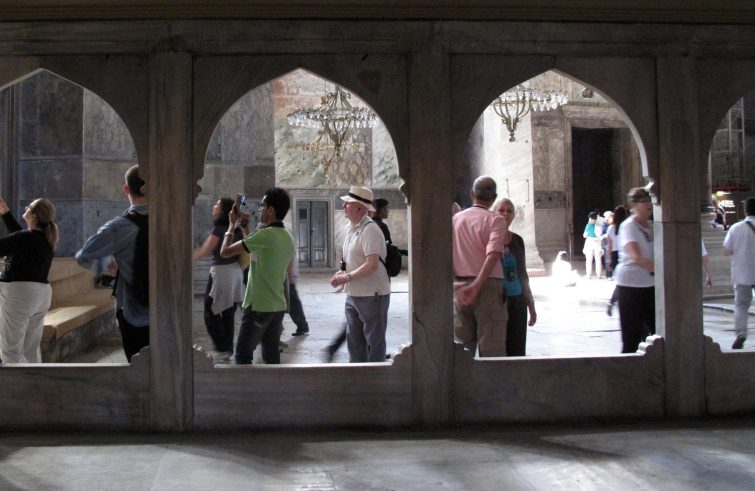
 “Hagia Sophia is a monument that belongs to humankind. Unfortunately, it has been instrumentally exploited for internal and regional political reasons. Now, the most important thing, especially for the whole Mediterranean region, is that this political decision does not affect our political, intercultural and inter-religious dialogue agendas. In fact it must strengthen our resolve to build a world of peace by triggering processes of reconciliation rather than division.” Cenap Aydin is Turkish, Muslim and has been running the interreligious dialogue centre Istituto Tevere in Rome, for many years already. On the eve of the ceremony which tomorrow will mark the conversion of the Basilica of Saint Sophia into a mosque, Cenap Aydin described to SIR how the Turkish people are living through this historic transformation. “The data is unclear. Some say 70% of the population is in favour, others 40%. But opinion polls in Turkey are unreliable. From what I understand, especially from social media reports, is that young people are not interested and perhaps not even sufficiently informed about what is happening. Others find this decision utterly unnecessary. What’s unclear is the reason for this: time is passing, we are living in another era. Regrettably, the conversion of Saint Sophia into a mosque indicates that there are still some who want to go back in time and undermine Turkey’s process of reconciliation with its historical past.” In this respect, Cenap Aydin noted that in addition to Hagia Sophia in Istanbul, also the Church of St. Sophia in Trebizond and the world-famous Church of the Holy Saviour in Chora, also in Istanbul, considered among the most remarkable examples of sacred Byzantine architecture still standing, have been transformed into mosques in recent years.
“Hagia Sophia is a monument that belongs to humankind. Unfortunately, it has been instrumentally exploited for internal and regional political reasons. Now, the most important thing, especially for the whole Mediterranean region, is that this political decision does not affect our political, intercultural and inter-religious dialogue agendas. In fact it must strengthen our resolve to build a world of peace by triggering processes of reconciliation rather than division.” Cenap Aydin is Turkish, Muslim and has been running the interreligious dialogue centre Istituto Tevere in Rome, for many years already. On the eve of the ceremony which tomorrow will mark the conversion of the Basilica of Saint Sophia into a mosque, Cenap Aydin described to SIR how the Turkish people are living through this historic transformation. “The data is unclear. Some say 70% of the population is in favour, others 40%. But opinion polls in Turkey are unreliable. From what I understand, especially from social media reports, is that young people are not interested and perhaps not even sufficiently informed about what is happening. Others find this decision utterly unnecessary. What’s unclear is the reason for this: time is passing, we are living in another era. Regrettably, the conversion of Saint Sophia into a mosque indicates that there are still some who want to go back in time and undermine Turkey’s process of reconciliation with its historical past.” In this respect, Cenap Aydin noted that in addition to Hagia Sophia in Istanbul, also the Church of St. Sophia in Trebizond and the world-famous Church of the Holy Saviour in Chora, also in Istanbul, considered among the most remarkable examples of sacred Byzantine architecture still standing, have been transformed into mosques in recent years.
What do Islamic sources say?
As prominent Muslim leaders in Italy have pointed out over the past few days, the Islamic religion does not encourage the conversion of non-Islamic places of worship. There have been many examples of this in the course of history. Perhaps the most significant is the case of Omar, the second Caliph of the Prophet Mohammed: when he entered Jerusalem, he was invited to pray in the church of the Holy Sepulchre but he refused, preferring to pray elsewhere. Thus I see no religious motive behind the conversion of Saint Sophia into a mosque based on the sources of the Islamic religion.
What is your view?
First of all, it strikes me that this decision was taken so quickly without having consulted international institutions nor the Ecumenical Patriarchate of Constantinople.
It seems to me that this lack of dialogue with Patriarch Bartholomew is a very serious matter. In fact, although it has always been denied, the seat of the Ecumenical Patriarchate in Fanar remains a centuries-old historical presence in the country.
It is therefore a clear political move?
This decision was not based on religious grounds. The prestigious Blue Mosque, a historical site visited by Popes and recently also by Pope Benedict and Pope Francis, is just a stone’s throw from Hagia Sophia. It is an extremely large mosque so there was no need for additional space for the faithful.
The conversion of Hagia Sophia is a symbolic political decision made for two reasons.
Which ones?
The first is linked to domestic politics. Erdogan needs to strengthen his power now that his party is facing a challenging situation after losing two major cities like Istanbul and Ankara in the recent elections and after the two closest collaborators – former Foreign Ministers and former Finance Minister – decided to form two opposition parties. The second is related to regional political reasons. It is no coincidence that Erdogan has posted on Twitter a hymn composed and dedicated to Hagia Sophia sung in the various tongues of the former Ottoman region.
This decision marks a significant backward step for Turkey in its rapprochement with Europe. Isn’t Erdogan afraid of isolation?
Erdogan’s politics are very much influenced by Turkey’s ultra-nationalist parties and these movements, mostly secular, have always claimed to make Hagia Sophia a mosque.
Pope Francis said he was very “saddened” by the decision. The World Council of Churches sent a letter to President Erdogan. The Higher Committee for Human Fraternity also spoke out on the matter. What can religious leaders do?
It is certainly a very delicate moment for people who believe in dialogue.
Spiritual leaders know how to reach people’s hearts and today it is their responsibility not to be manipulated by political decisions that use religious places or motivations to divide and stir tensions. We have a notable example of a religious leader in this regard. I am referring to St. John XXIII: he served as Apostolic Delegate in Turkey and Greece from 1935 to 1944. Those were certainly very different times, but he testified to his living spirituality by promoting inter-religious relations while exercising the utmost prudence. His Christian witness on Turkish soil today is an invitation not to succumb to pessimism, never to lose hope – however great and complex the challenges – for a better future.












